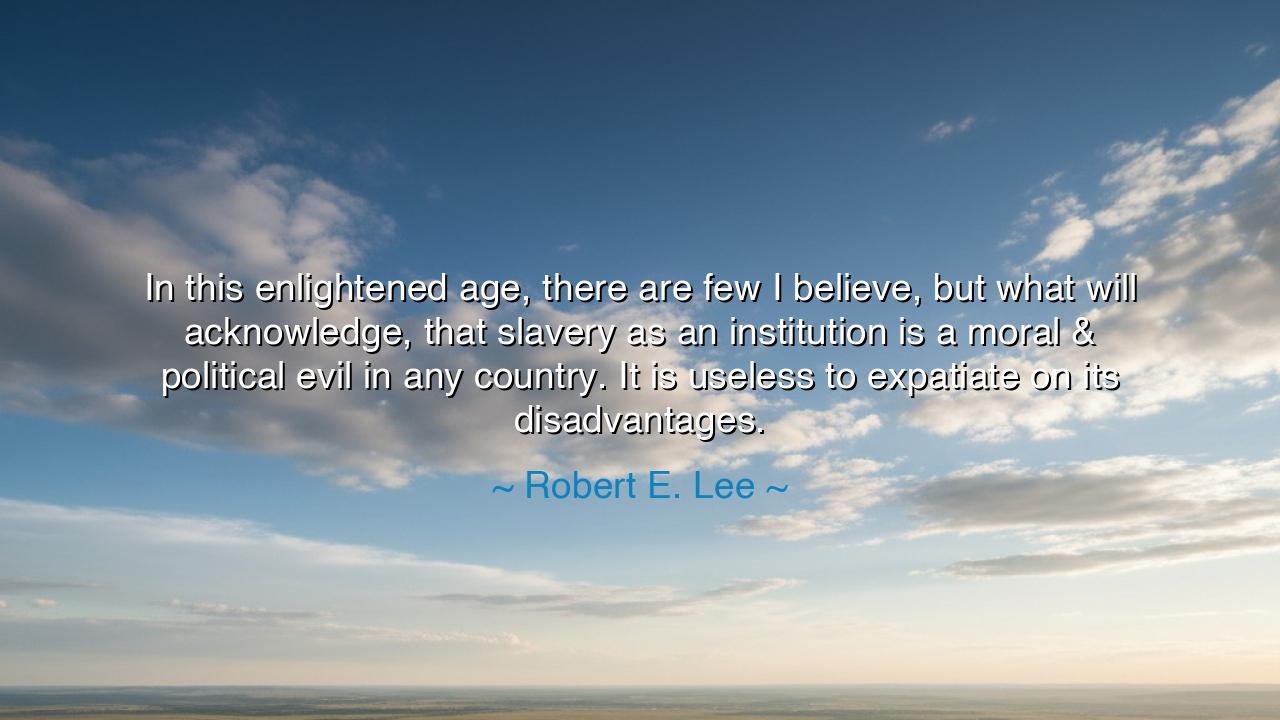
In this enlightened age, there are few I believe, but what will
In this enlightened age, there are few I believe, but what will acknowledge, that slavery as an institution is a moral & political evil in any country. It is useless to expatiate on its disadvantages.






In the midst of a world torn by conflict and strife, the great Robert E. Lee, a man of both noble heritage and somber reflection, once declared, “In this enlightened age, there are few I believe, but what will acknowledge, that slavery as an institution is a moral & political evil in any country. It is useless to expatiate on its disadvantages.” These words, uttered from a man caught in the crucible of history, speak not only of the specific struggles of his time but also of the timeless truth that echoes across the ages. For in the heart of Lee’s statement lies the simple, yet profound, conviction that the institution of slavery—whether in the context of his time or any other—must be seen for what it is: a deep moral stain upon humanity’s soul.
What does it mean, then, to speak of slavery as an “institution”? It is not merely a practice, not simply a societal structure, but a dehumanizing force that robs individuals of their very essence, their autonomy, and their inherent dignity. Throughout history, men and women have been enslaved, not only in the chains of their bodies but in the chains of their minds. They were forced to submit to the will of others, stripped of their voice and their freedom. Yet, the true evil of slavery lies not in its practice alone, but in its ability to warp the moral compass of those who engage in it, blinding them to the sanctity of life itself.
Consider, if you will, the story of Spartacus, the great gladiator who, with courage born of desperation, led a mighty rebellion against the chains of his captors. Though born a slave, he refused to accept his fate as a mere property to be bought and sold. His freedom was something that could not be taken from him, no matter the physical chains that bound him. In the end, he and his fellow slaves were crushed by the forces of Rome, but in their defeat, they became immortal. Their struggle was the eternal cry for justice, the assertion of human dignity that transcends the tyranny of slavery. Spartacus and his followers showed that slavery, as an institution, is not merely a political wrong, but a moral abomination that denies the very spirit of humanity.
Yet, as Robert E. Lee's words suggest, even in a time of deep division, there is a moment of clarity that comes when we see, as a collective, the truth of an institution like slavery. Lee’s acknowledgment that slavery is a moral and political evil came at a time when many still sought to defend it, when the scars of conflict and the weight of heritage clouded men’s judgment. But in those words, there is the recognition that no matter the forces at play—no matter the arguments used to justify it—slavery cannot stand. For the soul of a nation, and the soul of each individual, cannot be sustained upon the backs of others in chains.
Let us look, too, to the mighty and virtuous example of Abraham Lincoln, who rose to the challenge of his age, wielding the power of his office to end the evil of slavery. Through the Emancipation Proclamation, he sought to break the chains of the oppressed, not only in the physical sense but in the spiritual sense as well. His actions were an acknowledgment that a country built upon the ideals of freedom and equality could not remain whole while such an institution existed. Lincoln showed the world that the true strength of a nation lies not in its wealth or its military might, but in the righteousness of its moral standing.
Thus, we must heed Lee’s words as a call to examine our own times and the moral institutions we uphold. For there are still those who would seek to perpetuate systems of oppression and injustice, even in this “enlightened age.” We must ask ourselves: What is the slavery of our time? What are the systems that enslave the hearts and minds of men? Is it the poverty that traps people in cycles of despair? Is it the prejudice that binds communities in hatred? Or is it the corruption that chains the truth and perverts the course of justice?
The lesson for us, then, is clear. We must strive to recognize and abolish the systems of oppression that still exist around us. We must act, as Spartacus did, in the face of overwhelming odds, and demand freedom for all. And as Lincoln showed, we must use the power we possess, whether through words, laws, or action, to dismantle these chains and uplift our fellow human beings. In doing so, we will not only find freedom for others but will also find the true strength of our own souls.
So, let us stand, as Lee called us to do, acknowledging the evils that continue to exist, and strive to be warriors of justice. Let us not rest until every soul is free, for only then will we know the fullness of our own humanity, and only then will we be able to stand in the light of a truly enlightened age.






AAdministratorAdministrator
Welcome, honored guests. Please leave a comment, we will respond soon